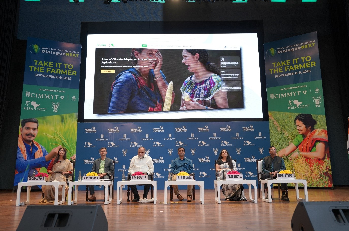15 September 2025, New Delhi
South Asia, home to nearly one-fourth of the global population and a critical hub for global food security, is increasingly facing the brunt of climate change. Rising floods, heatwaves, droughts, and erratic rainfall are putting immense pressure on smallholder farmers, making climate adaptation strategies more urgent than ever.
To address these challenges, the International Maize and Wheat Improvement Center (CIMMYT) and the Borlaug Institute for South Asia (BISA), in collaboration with the Indian Council of Agricultural Research (ICAR) and other regional partners, have launched the Atlas of Climate Adaptation in South Asian Agriculture (ACASA) the first of its kind for the region. Supported by the Bill & Melinda Gates Foundation, the Atlas is co-owned and co-developed by CIMMYT-BISA, ICAR (India), Bangladesh Agricultural Research Council (BARC), Nepal Agricultural Research Council (NARC), and the Natural Resources Management Center (NRMC), Sri Lanka.
ACASA is a dynamic, web-enabled platform that integrates high-resolution climate data, scientific modeling, and expert-validated adaptation practices. Covering 15 crops and six livestock species, the Atlas provides climate risk assessments at a granular resolution of 25 sq. km (equivalent to 4–5 villages). It enables users to visualize risks, explore localized adaptation strategies, and access open-source data, codes, and scripts for research and policy planning.
The initiative aims to strengthen climate-smart decision-making and unlock greater investments in agricultural resilience. It is designed to support policymakers, governments, financial institutions, agri-food industries, insurance providers, donors, and civil society organizations in advancing climate adaptation measures.
Speaking at the launch, Dr. B.M. Prasanna, Managing Director, BISA, said, “BISA is proud to collaborate with its regional partners in developing ACASA. The platform highlights practical adaptation strategies that can inform climate-smart investments and policies, ultimately strengthening resilience in South Asia’s agricultural systems.”

Highlighting India’s priorities, Dr. ML Jat, Secretary (DARE) & Director General, (ICAR), stated, “ICAR values global collaboration to share knowledge and experiences on climate action. Tools like ACASA are vital to accelerating climate adaptation strategies, aligning with India’s Amrit Kaal vision of sustainable development.”
Dr. Nazmun Nahar Karim, Executive Chairman, BARC, Bangladesh, expressed optimism, stating, “The ACASA project is being implemented with clear objectives across four countries. I am confident it will achieve its goals and deliver meaningful benefits to farmers and stakeholders.”
From Nepal, Dr. Krishna Prasad Timsina, Executive Director, NARC, emphasized the country’s vulnerability to climate risks, adding, “ACASA complements Nepal’s efforts to build climate resilience, especially in the mid- and far-western regions, mountains, and southern plains.”
Similarly, Dr. W.A.R.T. Wickramaarachchi, Director General, Department of Agriculture, Sri Lanka, underlined the need for localized assessments: “Sri Lanka’s path toward climate-smart agriculture requires comprehensive evaluations of climate risks and adaptation strategies. The Atlas provides the much-needed framework to quantify risks and identify effective options.”
By pooling regional expertise and leveraging advanced digital tools, ACASA represents a landmark collaboration for climate-resilient agriculture in South Asia. The platform offers farmers, researchers, and policymakers actionable pathways to reduce risks and secure food systems in the face of a changing climate.
(Source: International Relations Department, ICAR)








Like on Facebook
Subscribe on Youtube
Follow on X X
Like on instagram